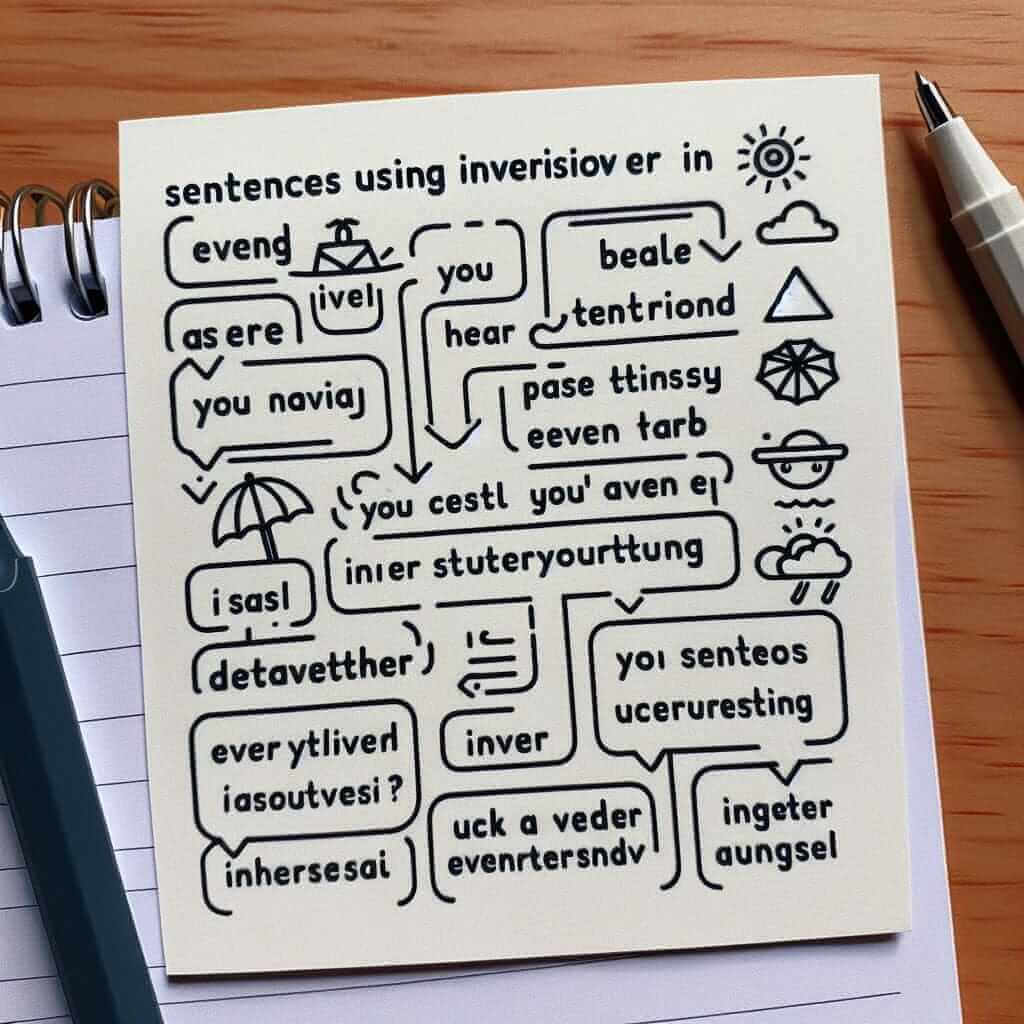“Little did they know about the surprise” – a phrase that rolls off the tongue with a hint of drama and intrigue. This structure, known as inversion, is a powerful tool that can elevate your IELTS writing and speaking, showcasing a sophisticated command of the English language. While less common in everyday speech, inversion is frequently employed in literature, academic writing, and yes, even the IELTS exam.
Let’s illustrate its use with a few examples:
Speaking Example (Part 2):
“Describe a time you received good news.”
“I was at work when the email arrived. Little did I know, it contained news that would change my life forever – I had been accepted into my dream university!”
Writing Example (Task 2):
“Some people believe that success in life is determined by hard work, while others believe it is more a matter of luck. Discuss both views and give your opinion.”
“While fortune undoubtedly plays a role, rarely do individuals achieve greatness without significant effort and dedication.“
In each of these examples, inversion adds emphasis and a touch of formality. Mastering this grammatical structure can be your secret weapon to achieving a higher band score.
Deconstructing “Little Did They Know”
1. Understanding Inversion and its Significance in IELTS
Inversion deviates from the standard subject-verb-object word order in English. Instead of “They did not know about the surprise,” we invert the subject and auxiliary verb to create “Little did they know about the surprise.”
Why is this important for IELTS?
- Demonstrates Grammatical Range and Accuracy: Using inversion correctly showcases your ability to manipulate sentence structure for effect.
- Enhances Lexical Resource: Inversion often pairs with more formal vocabulary (e.g., “little,” “rarely,” “never”), demonstrating your lexical range.
- Creates Impact and Style: Inversion adds emphasis, sophistication, and a touch of literary flair to your writing and speaking.
2. The Formula and its Application
Structure:
Negative Adverbial + Auxiliary Verb + Subject + Main Verb
Examples:
- Never before had I seen such beauty. (Adverbial: Never before)
- Not only does she sing, but she also dances beautifully. (Adverbial: Not only)
- Under no circumstances should you open this door. (Adverbial: Under no circumstances)
Application in IELTS:
- Writing Task 1 (describing trends): “Seldom has the demand for renewable energy been so high.“
- Writing Task 2 (expressing strong opinions): “Only by working together can we overcome this challenge.“
- Speaking Part 3 (discussing abstract ideas): “Rarely do we stop to consider the consequences of our actions.“
3. Mastering Inversion with Examples
Example 1 (Writing Task 2):
Topic: “The use of technology is replacing the need for human interaction. To what extent do you agree or disagree?”
Sentence with inversion: “Rarely in human history has technology advanced at such a rapid pace, leaving some to question its impact on social connection.“
Analysis: The use of “Rarely” followed by the inverted structure “has technology advanced” adds weight to the argument and introduces the essay’s topic effectively.
Example 2 (Speaking Part 2):
Topic: “Describe a time you had to overcome a challenge.”
Sentence with inversion: “Not only did the experience test my physical limits, but it also pushed me to dig deep emotionally.“
Analysis: The inverted phrase “Not only did” emphasizes the multifaceted nature of the challenge, highlighting both physical and emotional aspects.
4. Elevating Your Language: Advanced Inversions
To achieve even higher band scores, consider these variations:
- Inversion with conditional clauses (using “should,” “had”): “Had I known the truth, I would have acted differently.”
- Inversion with comparative structures: “No sooner had I arrived than the problems began.”
5. Common Pitfalls to Avoid
- Overuse: Inversion is impactful when used sparingly. Don’t force it into every sentence.
- Incorrect Word Order: The auxiliary verb always comes before the subject.
- Informal Context: Inversion is generally more suitable for formal writing and speaking.

Conclusion: Inversion – Your Key to IELTS Success
Mastering inversion is like adding a sophisticated tool to your grammatical toolbox. Use it strategically to add emphasis, variety, and a touch of elegance to your IELTS responses. Remember to practice implementing this structure in various contexts to truly unlock its potential and boost your confidence on exam day.